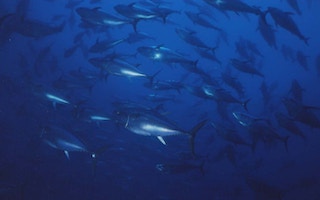As negotations get underway to establish the rules for mining minerals from the ocean floor, a coalition of seafood industry organisations has called for a moratorium on seabed extraction.
In a statement published on Tuesday (11 July), industry groups including the Sustainable Seafood Coalition, Global Tuna Alliance and FishWise appealed for a pause on deep-sea mining until the impacts of extraction are clearly understood.
Drilling for seabed minerals could proceed on an industrial scale once mining regulations have been set by the International Seabed Authority (ISA). The United Nations-backed regulator for the exploration and extraction of the seafloor is meeting this week to negotiate the rules for seabed extraction in international waters, a process that has been contested for almost three decades.
To continue reading, just sign up – it’s free!
- Get the latest news, jobs, events and more with our Weekly Newsletter delivered to you free.
- Access the largest repository of news and views on sustainability topics.
- You can publish your jobs, events, press releases and research reports here too!
Newsletter subscribers do not necessarily have a website account. Please sign up for free to continue reading!
The talks are taking place two years after the Pacific island nation of Nauru invoked a rule that will require the ISA to set regulations for deep-sea mining. The deadline for finalising the rules was Sunday (9 July). Once the rules have been approved, mining companies can start to accelerate the exploration of a vast area of the Pacific floor rich in minerals such as cobalt, nickel and copper, which pro-miners argue are essential to power the energy transition.
The seafood coalition said there was a need for “strong, scientifically-grounded” regulations before any exploitation contracts are granted by the ISA.
“
We strongly recommend a pause on deep-sea mining until there is a clear understanding of the impacts the industry may have on the marine
environment, its living resources, and those dependent on them.Seafood industry coalition
The group named a range of potential impacts from seabed mining that could harm fisheries, including resource contamination from toxic metals, sediment plumes that prevent fish from feeding, and noise and light pollution that alter fish behaviour and migration patterns.
The seafood industry’s opposition to seabed mining emerges as a new study, published in Nature on Tuesday (11 July), provides evidence that climate change will compound the negative impacts of deep-sea mining on tuna fisheries. Sea-warming is pushing tuna into areas where mining is being planned, warn scientists, including marine biologist Diva Amon, in the study.
The seafood industry is the latest stakeholder group to push back against seabed mining, which some commmentors believe is inevitable given the vast commercial potential of extraction; sea-bottom mineral reserves are estimated to be worth between US$8 trillion to US$16 trillion.
Last month, Switzerland, a global commodities trading hub, called for a ban on deep-sea mining until protection from the “harmful effects” of extraction could be ensured. France, New Zealand, Germany, Costa Rica, Chile, Spain, Panama, Ecuador, Vanuatu, Dominican Republic, Ireland, Fiji, Palau and Samoa have also called for a ban or precautionary pause until more is known about the effects of deep-sea extraction.
Diva Amon said several more countries will join the call for a moratorium over the next three weeks of negotiations. “Many are acknowledging the triple crises of climate change, biodiversity extinction and pollution, and that we can’t just hold our breath and hope that adding deep-sea mining, with its potentially significant sustainability and equity issues, will be okay,” she told Eco-Business.
Japan, South Korea, United States, Russia, Australia and Singapore are among the countries in favour of ocean extraction. They argue that seabed minerals are needed to decarbonise the global economy. The International Energy Agency has said that acheiving net-zero emissions will require six times more of certain minerals by 2040 than are being mined today, while seabed mining firms contend that the environmental cost of land-based mining is far greater than digging up the ocean floor.
Companies including BMW, Samsung, Google and Volvo – which use transition minerals in their products – have also voiced their opposition to seabed mining, as have banks such as Credit Suisse, Standard Chartered and ABN Amro.
A scientific analysis published in 2018 predicted that biodiversity loss from deep sea mining will be impossible to avoid. Researchers pointed out that the ecological consequences of deep sea biodiversity are unknown and may have inter-generational consequences, including altering the oxygen carrying capacity of the ocean.
Amon said that improvements to the circular economy for transition minerals would reduce the need to mine transition minerals. “There has already been huge battery and technological innovation to move away from nickel and cobalt. Necessity is the mother of all invention - I can only imagine what will be created in the next 10 years. Going into the deep ocean to cause irreparable damage for some minerals we may not need for much longer is extremely misguided,” she said.

















